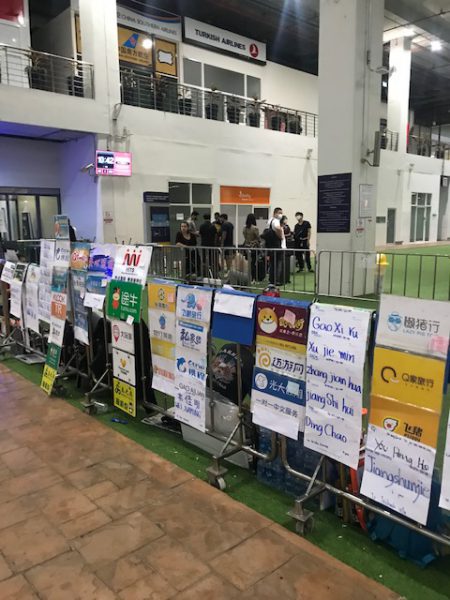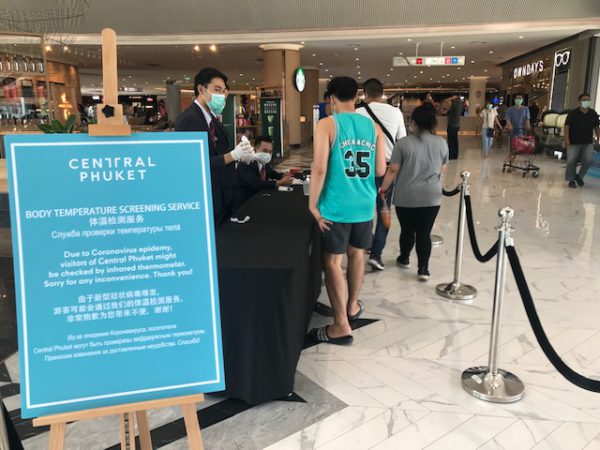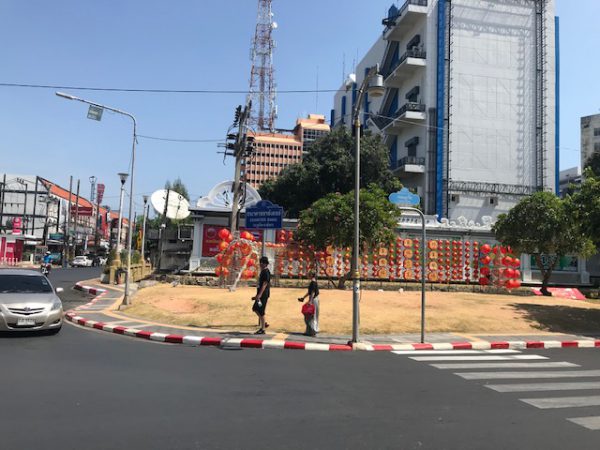PHUKET, 5 February 2020: When our plane touches down at Phuket International Airport, half the passengers on the flight from India put on N95 paper face-masks and disposable green surgical masks, adjusting the elasticated straps to ensure a more comfortable fit or fiddling with the ties, so the pleated mask covers both mouth and nose.
The Indigo cabin crew do the same, sending us off with muffled ‘goodbyes’ and ‘thank yous’, and as we deboard ground crew stand around hesitantly, also fitted with flimsy face-masks.
There is a camera with a thermal scanner to file past, though as our departure was from Bangalore and not Beijing, there seems no effort to screen passengers. The dedicated queue for Chinese for ‘visa-on-arrival’ is empty – there have been calls by the public health minister for the government to scrap its ‘visa-on-arrival’ for Chinese tourists.

On the arrivals board, some flights from China have ‘CANCELLED’ blinking away in red, but some flights from Mainland China are still landing, with additional screening in place in a more secure area of the airport meaning that only once passengers have shown they don’t have a fever or any other symptoms they can complete immigration formalities and mingle with other passengers waiting for their luggage at the carousels.
Outside the arrivals hall, in barricaded sections set aside for tour personnel waiting for Chinese on low-cost ‘zero-fee’ tours, there is only a handful of guides clutching name signs looking forlornly at mobile phones for updates.
Besides the airport, rows of tour buses sit idle in parking lots and vacant sections. It is estimated that 300 or so buses are surplus to requirements.
Late last month outbound tour groups from China were banned from leaving China, and from the 5 February, independent travellers won’t be allowed to exit China or enter Thailand.
Chinese tourists are the main source for many hotels across Thailand, and in Phuket, it is estimated 80% of Chinese visitors are part of tour groups. Last year Chinese holidaymakers spent USD18 billion, more than a quarter of all spending by foreigners. Phuket is the second most visited destination after Bangkok.
The driver of my taxi puts on a face-mask to protect himself against any germs I might be carrying, but still drives at over 100 km an hour dodging in and out of lanes to pass slower vehicles.
Thailand’s first case of human-to-human transmission was confirmed last week, a Phuket taxi driver who took Chinese tourists to a hospital tested positive for the novel coronavirus. To date, Thailand has more confirmed cases than any other country outside China – its first case was reported on 13 January, and currently, there are 19 confirmed cases. The coronavirus has spread to 25 countries from its origin in a fresh market in Wuhan which sold wild animals.
At the Prime Town Phuket hotel in the centre of the island, I get the impression that the new facility which opened on Chinese New Year was expecting more than just one family from Beijing who arrived just after me. Health officials in Phuket announced they would be visiting hotels and accommodation frequented by Chinese to monitor the health of every guest.
Around Phuket old town, which has a rich Chinese history and heritage dating back to Hokkien tin miners in the 19th century, red lanterns have been strung up across the streets, but the atmosphere is more subdued. Thailand has become the dream destination for Chinese escaping the winter chill and enjoying the sunshine, beaches and islands, but Chinese-friendly Phuket town with its tri-lingual signs and payment by Wechat and Alipay widely accepted struggles to survive on the few Chinese families and couples, who wander the streets among the faded shopfronts.
Arrivals are already down 30% from this time last year in Phuket, and many involved in tourism or hospitality are complaining about the downturn, which had already started in the last year before the killer blow of the coronavirus.
Despite the low numbers of Chinese, there are plenty of Europeans and Russians in Phuket. However, among some of the visitors I talked to, there were concerns that the virus might spread, or lead to more restrictions on travel across Asia. Mila from Berlin is worried her plans to spend six months in Southeast Asia might be jeopardised. “It is a shame that because Chinese have been eating and using wild animals, and also as the government hasn’t acted fast enough or with transparency that this virus is spreading.”
“I just hope it doesn’t ruin my trip,” backpacker Vladimir from St Petersburgh tells me as I sip my iced latte at Bookhemian Coffee, after sharing his conspiracy theory about who is really behind the ‘black swan’ event.
Already fake news has spread on social media from Phuket, with a story going viral claiming a foreigner died of the virus at Phuket International Airport, accompanied by a photo of a person being wheeled out into an ambulance. In reality, the woman from China just had a minor stroke and was later discharged from hospital. For the tourism industry in southern Thailand, it remains to be seen whether this is just a minor blip in the region’s tourism growth or a longer-lasting event that impacts across the tourism-dependent economy and trickles down to all aspects of life.

Keith Lyons (keithlyons.net) is an award-winning writer from New Zealand, based in Asia. ‘Opening Up Hidden Myanmar’ (Duwon Books) along with his writing and photographs contributed to ‘The Best of Myanmar: The Golden Land of Hidden Gems’ (KMG) will be published shortly.









